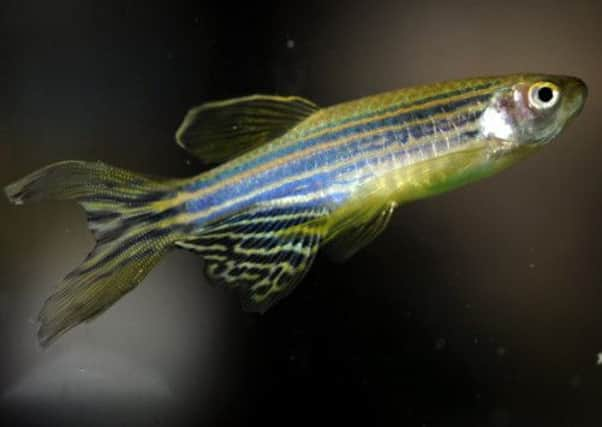Fish cells hope for motor neurone disease patients


Scientists at Edinburgh University have found a key hormone allows young zebrafish to develop and replace their motor neurons – a kind of nerve cell found in the spinal cord.
Researchers hope that the discovery will help in their efforts to create neurons from stem cells in the labs which could replace the damaged cells in patients.
Advertisement
Hide AdAdvertisement
Hide AdThis will help in further research into treatments for the devastating condition, for which there is currently no cure.
In humans, motor neurons control important muscle activities such as speaking, walking and breathing. When these cells stop working in patients with motor neurone disease, it causes difficulties in these motor functions, which eventually lead to paralysis and death.
Humans cannot replace motor neurons when they break down and stop working.
But zebrafish are able to replace these cells, offering researchers the hope the phenomena might be adapted to help human patients.
The study, led by scientists at Edinburgh’s Centre for Neuroregeneration, is the first to show that a signal released from the fish’s brain – in the form of a hormone called dopamine – triggers the development and regeneration of cells in the spinal cord.
Dopamine acts on a mechanism, which is known as the “hedgehog pathway”, to increase the number of motor neurons formed in the developing spinal cord of zebrafish.
The dopamine signal was found to act in a similar way to replace damaged cells in adult zebrafish.
Dopamine was also found to drive the development of motor neurons in human embryonic stem cells.
Advertisement
Hide AdAdvertisement
Hide AdAccording to the charity Motor Neurone Disease Scotland, around 90 per cent of people live for three to five years from the onset of symptoms, with about 10 per cent living for over five years and a number living for ten or more years.
Dr Catherina Becker, one of the lead authors of the study, said: “Our work sheds light on the way in which motor neurons develop and regenerate, and could inform research that leads to an increased understanding of motor neurone disease and spinal cord injuries.”
Dr Becker said scientists had long been looking for ways of making motor neurons and see what influences stem cells to become motor neurons.
The aim would be to make enough of the cells to transplant them back into the patient or do research on them to see what makes them survive, she said.
Finding the link between the cells forming and dopamine could be key to future treatments being developed.
“Dopamine has been known to be a very important molecule in the brain but it was not known that during development it influences how many motor neurons the fish makes, so that is what we found,” Dr Becker said.
The researcher said one possible step forward was to discover if drugs could mimic the effect of dopamine to help people with motor neurone disease. “We are not doing research on humans but other people might want to take the drug and see whether it has an effect on patients with motor neurone disease,” she added.